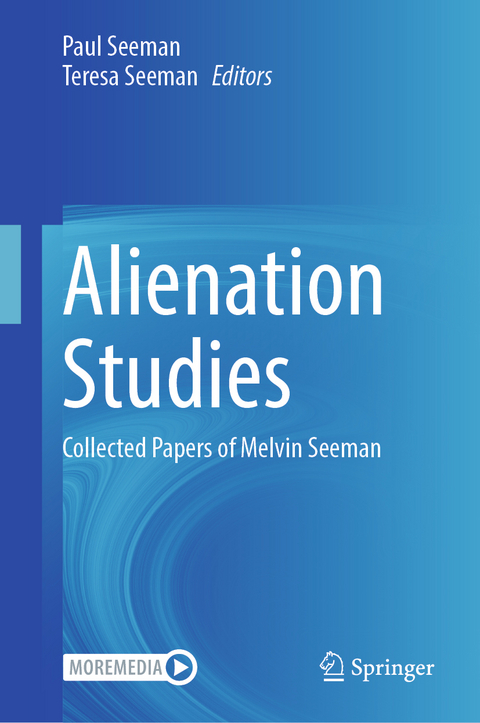
Alienation Studies
Springer International Publishing (Verlag)
978-3-031-07217-8 (ISBN)
This book compiles cross-cultural studies on alienation undertaken by the late Dr. Melvin Seeman, including relevant historical and theoretical contexts and analyses related to the ongoing development of the alienation model and its counterparts in the behavioral sciences. Chapters track the development of this model across a half-century of interdisciplinary research, encompassing various research partnerships over the years.
Paul Seeman, is a former Superior Court Judge and Commissioner. He was the California Juvenile Court Judge of the Year in 2009, taught Juvenile Dependency and Delinquency for the Continuing Judicial Studies Program of the Center for Judicial Education and Research (CJER), and was a member of the California Judicial Council Task Force for Criminal Justice Collaboration on Mental Health Issues. A graduate of UC Santa Cruz with Highest Honors in Sociology, Paul Seeman also taught at UCSC as a guest lecturer on the Sociology of Law and Juvenile Justice. He has volunteered as a Deputy Director of Voter Protection for the Nevada Democratic Party, and currently serves on the Steering Committee of the Los Angeles Regional Reentry Partnership. Teresa Seeman, is a Professor of Medicine & Epidemiology at the University of California, Los Angeles. Trained as a social epidemiologist, with a PhD from the University of California, Berkeley. Her interdisciplinary research has focused on understanding the health effects of social contexts (e.g., socio-economic status, social relationships) and psychological characteristics (e.g., control beliefs, perceptions of self-efficacy), including effects on risks for physical and cognitive decline as well as overall longevity. Dr. Seeman has a long history of funding from the National Institutes of Health for a range of large, community-based research efforts and has published over 400 research articles in peer-reviewed journals.
PART I. DEVELOPMENT OF THE THEORETICAL FRAMEWORK.- Chapter 1. On the Meaning of Alienation.- Chapter 2. Internal Versus External Control of Reinforcements: A Major Variable in Behavior Theory.- Chapter 3. Alienation Motifs in Contemporary Theorizing: The Hidden Continuity of the Classic Themes.- PART II. BUILDING AN EMPIRICAL MODEL.- Chapter 4. Stratification and Hospital Care: I. The Performance of the Medical Interne.- Chapter 5: Stratification and Hospital Care: II. The Performance of the Medical Interne.- Chapter 6. Alienation and Learning in a Hospital Setting.- Chapter 7. Alienation and Social Learning in a Reformatory.- Chapter 8. Alienation and Knowledge-Seeking: A Note on Attitude and Action.- Chapter 9. Powerlessness and Knowledge: A Comparative Study of Alienation and Learning.- Chapter 10. Organizations and Powerlessness: A Test of the Mediation Hypothesis.- Chapter 11. Social Learning Theory and the Theory of Mass Society.- Chapter 12: Health Behavior andPersonal Autonomy: A Longitudinal Study of the Sense of Control in Illness.- PART III. HEALTH AND ALIENATION.- Chapter 13. Social Networks and Health Status: A Longitudinal Analysis.- Chapter 14. Social Status and Biological Dysregulation: The "Status Syndrome" and Allostatic Load.- Chapter 15. Powerlessness, Health, and Mortality: A Longitudinal Study of Older Men and Mature Women.- Chapter 16. Life Strains, Alienation, and Drinking.- PART IV. WORK AND ALIENATION.- Chapter 17. Powerlessness, Work, and Community: A Longitudinal Study of Alienation and Alcohol Use.- Chapter 18. Alienation and Alcohol: The Role of Work, Mastery, and Community in Drinking Behavior.- Chapter 19. On the Biopsychosocial Cost of Alienated Labor.- PART V. POLITICAL PROTEST AND ALIENATION.- Chapter 20. The Signals of '68: Alienation in pre-Crisis France.- Chapter 21. A Legacy of Protest: The Events of May in Retrospect.- Chapter 22. Some Correlates of Civil Rights Activism.- PART VI. REVISITING THE THEORETICAL PERSPECTIVE.- Chapter 23. The Urban Alienations: Some Dubious Theses from Marx to Marcuse.- Chapter 24. Sentiments and Structures: Strategies for Research in Alienation.- Chapter 25. Alienation and Engagement.- Chapter 26. Community and Control in a Metropolitan Setting.- PART VII. CONCLUSIONS.- Chapter 27. Status and Identity: The Problem of Inauthenticity.- Chapter 28. Alienation: Psychosociological Tradition.- Chapter 29. The Elusive Situation in Social Psychology.
| Erscheinungsdatum | 12.01.2023 |
|---|---|
| Zusatzinfo | XXVII, 600 p. 2 illus., 1 illus. in color. |
| Verlagsort | Cham |
| Sprache | englisch |
| Maße | 155 x 235 mm |
| Themenwelt | Geisteswissenschaften ► Psychologie ► Psychoanalyse / Tiefenpsychologie |
| Geisteswissenschaften ► Psychologie ► Sozialpsychologie | |
| Schlagworte | Agency • Alienation • alienation and activism • alienation and health • alienation and political protest • alienation model • community and alienation • meaninglessness • normlessness • Powerlessness • self-estrangement • Social Isolation • social learning • social networks and health status • Social Psychology • work alienation |
| ISBN-10 | 3-031-07217-0 / 3031072170 |
| ISBN-13 | 978-3-031-07217-8 / 9783031072178 |
| Zustand | Neuware |
| Informationen gemäß Produktsicherheitsverordnung (GPSR) | |
| Haben Sie eine Frage zum Produkt? |
aus dem Bereich


